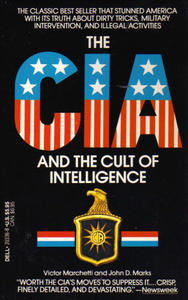
Richard McGarrah Helms was an American government official and diplomat who served as Director of Central Intelligence (DCI) from 1966 to 1973. Helms began intelligence work with the Office of Strategic Services during World War II. Following the 1947 creation of the Central Intelligence Agency (CIA), he rose in its ranks during the presidencies of Truman, Eisenhower and Kennedy. Helms then was DCI under Presidents Johnson and Nixon, yielding to James R. Schlesinger in early 1973.

The director of central intelligence (DCI) was the head of the American Central Intelligence Agency from 1946 to 2004, acting as the principal intelligence advisor to the president of the United States and the United States National Security Council, as well as the coordinator of intelligence activities among and between the various US intelligence agencies.
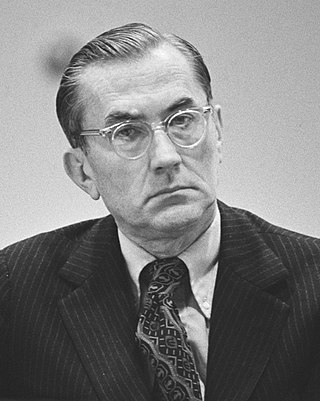
William Egan Colby was an American intelligence officer who served as Director of Central Intelligence (DCI) from September 1973 to January 1976.
Operation Mockingbird is an alleged large-scale program of the United States Central Intelligence Agency (CIA) that began in the early years of the Cold War and attempted to manipulate domestic American news media organizations for propaganda purposes. According to author Deborah Davis, Operation Mockingbird recruited leading American journalists into a propaganda network and influenced the operations of front groups. CIA support of front groups was exposed when an April 1967 Ramparts article reported that the National Student Association received funding from the CIA. In 1975, Church Committee Congressional investigations revealed Agency connections with journalists and civic groups.
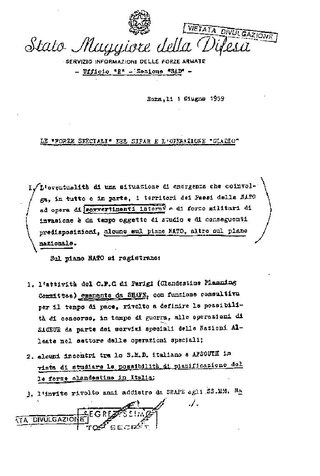
Operation Gladio was the codename for clandestine "stay-behind" operations of armed resistance that were organized by the Western Union (WU), and subsequently by NATO and by the CIA, in collaboration with several European intelligence agencies during the Cold War. Although Gladio specifically refers to the Italian branch of the NATO stay-behind organizations, Operation Gladio is used as an informal name for all of them. Stay-behind operations were prepared in many NATO member countries, and in some neutral countries.
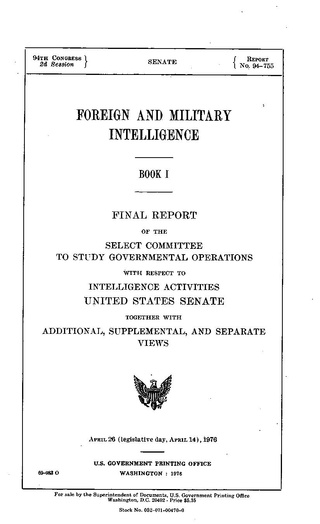
The Church Committee was a US Senate select committee in 1975 that investigated abuses by the Central Intelligence Agency (CIA), National Security Agency (NSA), Federal Bureau of Investigation (FBI), and the Internal Revenue Service (IRS). Chaired by Idaho Senator Frank Church (D-ID), the committee was part of a series of investigations into intelligence abuses in 1975, dubbed the "Year of Intelligence", including its House counterpart, the Pike Committee, and the presidential Rockefeller Commission. The committee's efforts led to the establishment of the permanent US Senate Select Committee on Intelligence.

The Directorate of Operations (DO), less formally called the Clandestine Service, is a component of the US Central Intelligence Agency. It was known as the Directorate of Plans from 1951 to 1973; as the Directorate of Operations from 1973 to 2004; and as the National Clandestine Service (NCS) from 2004 to 2015.

The United States Central Intelligence Agency (CIA) has been accused of involvement in the trafficking of illicit drugs. Books and journalistic investigations on the subject that have received general notice include works by the historian Alfred McCoy, professor and diplomat Peter Dale Scott, journalists Gary Webb and Alexander Cockburn, and writer Larry Collins. These claims have led to investigations by the United States government, including hearings and reports by the United States House of Representatives, Senate, Department of Justice, and the CIA's Inspector General. The various investigations have generally not led to clear conclusions that the CIA itself has directly conducted drug trafficking operations, although there may have been instances of indirect complicity in the activities of others.

Ralph Walter McGehee Jr was an American case officer for the Central Intelligence Agency (CIA) for 25 years and an author.
CounterSpy was an American magazine that published articles on covert operations, especially those undertaken by the American government. It was the official Bulletin of the Committee for Action/Research on the Intelligence Community (CARIC). CounterSpy published 32 issues between 1973 and 1984 from its headquarters in Washington DC.

The Central Intelligence Agency, known informally as the Agency, metonymously as Langley and historically as the Company, is a civilian foreign intelligence service of the federal government of the United States tasked with gathering, processing, and analyzing national security information from around the world, primarily through the use of human intelligence (HUMINT) and conducting covert action through its Directorate of Operations. The agency is headquartered in the George Bush Center for Intelligence in Langley, Virginia.
Gerald Patrick "Gerry" Hemming, Jr. was a former U.S. Marine, mercenary and Central Intelligence Agency asset within the Domestic Contact Division beginning in 1960, using the aliases Jerry Patrick, Gerry Patrick, Heming and Hannon. He was primarily involved in covert operations against Cuba.
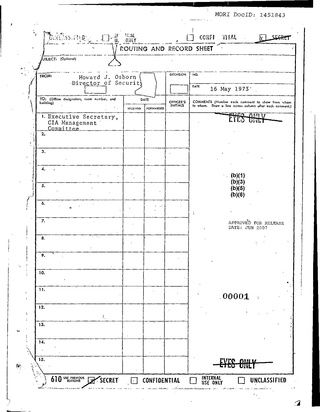
The "Family Jewels" is the name of a set of reports detailing illegal, inappropriate and otherwise sensitive activities conducted by the Central Intelligence Agency from 1959 to 1973. William Colby, the CIA director who received the reports, dubbed them the "skeletons in the CIA's closet". Most of the documents were released on June 25, 2007, after more than three decades of secrecy. The non-governmental National Security Archive filed a request for the documents under the Freedom of Information Act fifteen years before their release.
Victor Leo Marchetti Jr. was a special assistant to the Deputy Director of the Central Intelligence Agency who later became a prominent critic of the United States Intelligence Community and the Israel lobby in the United States.
At various times, under its own initiative or in accordance with directives from the President of the United States or the National Security Council staff, the Central Intelligence Agency (CIA) has attempted to influence public opinion both in the United States and abroad.

The Central Intelligence Agency (CIA) is a civilian foreign intelligence service of the United States federal government, tasked with gathering, processing, and analyzing national security information from around the world.
John D. Marks is the founder and former president of Search for Common Ground (SFCG), a nonprofit organization based in Washington, D.C., that focuses on international conflict management programming. Marks now acts as a senior adviser to SFCG. He is also a former foreign service officer of the U.S. Department of State, and he co-authored the 1974 book The CIA and the Cult of Intelligence with Victor Marchetti.
At various times since the creation of the Central Intelligence Agency, the Federal government of the United States has produced comprehensive reports on CIA actions that marked historical watersheds in how CIA went about trying to fulfill its vague charter purposes from 1947. These reports were the result of internal or presidential studies, external investigations by congressional committees or other arms of the Federal government of the United States, or even the simple releases and declassification of large quantities of documents by the CIA.
The Report on the Covert Activities of the Central Intelligence Agency is a 69-page formerly classified comprehensive study on the personnel, security, adequacy, and efficacy of the Central Intelligence Agency written by Lieutenant General James H. Doolittle. United States President Dwight Eisenhower requested the report in July 1954 at the height of the Cold War and following coups in Iran and Guatemala. The report compares with other contemporary Cold War documents such as George Kennan's "X" article in Foreign Affairs, which recommended a policy of "containment" rather than direct confrontation with the Soviet Union, and NSC 68, the secret policy document produced in 1950, which recommended a similarly restrained policy of “gradual coercion.” Doolittle wrote with an abandon-all-principles approach that conveyed the national fear that the United States faced the prospect of annihilation at the hands of the Soviet Union: “It is now clear that we are facing an implacable enemy whose avowed objective is world domination by whatever means and at whatever cost,” Doolittle wrote. “There are no rules in such a game… If the United States is to survive, long standing concepts of ‘fair play’ must be reconsidered.” Doolittle’s forceful policy and language reflected the fear that motivated American citizens and policymakers in the wake of Soviet Communism.
